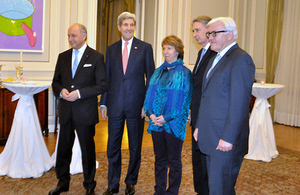E3+3 talks with Iran in Vienna conclude on 24 November with further extension agreed to 30 June 2015
Progress made during intensive talks in Vienna trying to bridge the significant gaps which remain, leaving hope for a final deal

French Foreign Minister Laurent Fabius, US Secretary of State John Kerry, EU High Representative Baroness Catherine Ashton, UK Foreign Secretary Philip Hammond, Germany's Foreign Minister Frank-Walter Steinmeier
Talks in Vienna have concluded with agreement for a further extension to negotiations on Iran’s nuclear programme. The E3+3 (UK, US, Russia, China, France and Germany), the European External Action Service (EAS) and Iran have been attempting to broker a deal over the extent of Iran’s current and future nuclear programme. After the self-imposed deadline passed on 24 November without a final deal agreed, talks were extended until 30 June 2015. But both sides are committed to a deal and have agreed to continue negotiations, aiming to secure a political framework for a final deal in four months, with a further three months to work out the technical detail. The extension does not mean a pause - talks will continue in December.
The British Foreign Secretary Philip Hammond hosted a meeting in Vienna at the British Ambassador’s Residence on 23 November with US Secretary of State John Kerry, Germany’s Foreign Minister Frank-Walter Steinmeier, French Foreign Minister Laurent Fabius and EU High Representative Baroness Catherine Ashton attending. Philip Hammond summed up the intensive efforts to secure a deal and keep the momentum going:
We’re all focused on trying to get to a deal … but there are still some very tough and complex issues to deal with. Everyone is talking about how we are trying to bridge that gap and take things forward.
Talks on Iran’s nuclear program began in 2004 between Iran and the UK, France and Germany, with the US, China and Russia joining negotiations in 2006. Since the November 2013 round of negotiations in Geneva and agreement on the Joint Plan of Action, the last twelve months have seen considerable political and technical effort to close remaining differences. A comprehensive deal would be a major breakthrough. For the international community it would mean: reassurance that Iran’s nuclear programme is exclusively peaceful and a safer region at a time of great unrest and instability. For Iran, it would mean the ability to trade freely with the world again and to reset relationships with the international community.